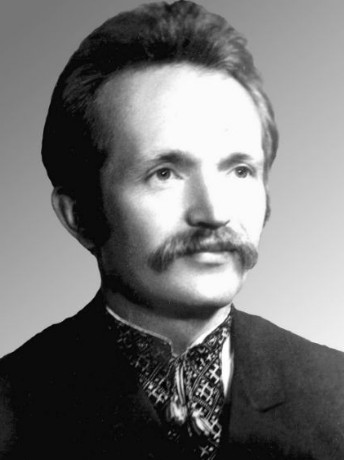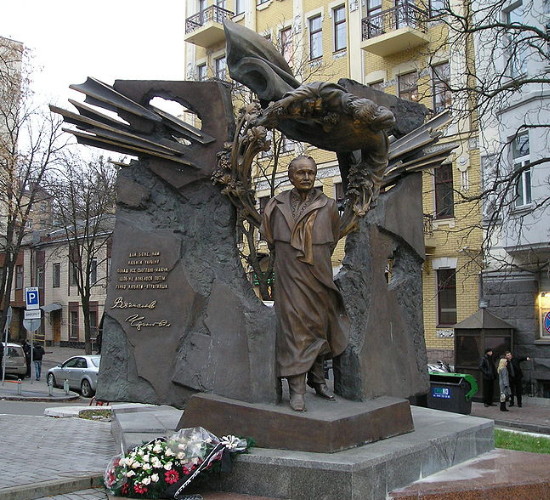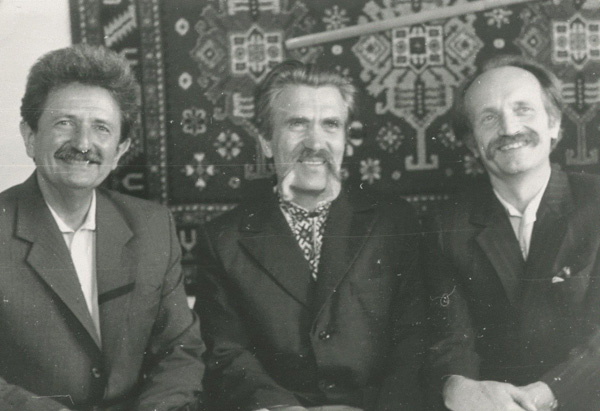Chornovil, Viacheslav
Chornovil, Viacheslav, aka Vyacheslav [Чорновіл, В’ячеслав; Čornovil, Vjačeslav], b 24 December 1937 in Yerky, now in Katerynopil raion, Cherkasy oblast, d 25 March 1999 near Horodyshche, Boryspil raion, Kyiv oblast. Prominent figure in the Ukrainian dissident movement and Soviet political prisoner, journalist, literary critic, politician, and leader of the national-democratic independence movement in Ukraine in the late 1980s and 1990s; husband of fellow dissidents Olena Antoniv and, after her death, Atena Pashko; father of Andrii Chornovil, a docent at the Lviv National Medical University, and politician Taras Chornovil.
Born into a family of teachers who suffered political persecution during the Stalinist period, Chornovil graduated with distinction from Kyiv University in journalism in 1960. In 1957 he was forced to interrupt his studies for a year after the faculty of journalism’s newspaper criticized him for ‘nonstandard thinking.’ He found work at the construction site of a blast furnace in Zhdanov (now Mariupol) in the Donbas and as an itinerant editor of the newspaper Kyїvs'kyi komsomolets' before returning to university in 1958. From July 1960 to May 1963 Chornovil worked as an editor of TV programs for youth in Lviv before returning to Kyiv with the intention of pursuing graduate studies in Ukrainian literature. Although he passed all of the entrance exams in 1964, he was denied admission to the graduate program at the Kyiv Pedagogical Institute because of his political beliefs. For the next two years he worked at the construction site of the Kyiv Hydro-Electric Station (until September 1964) and then as a department head at the newspaper Moloda hvardiia. In September 1965 Chornovil was sacked from his editor’s job for openly protesting, together with Ivan Dziuba and Vasyl Stus at the premiere of Serhii Paradzhanov’s film Shadows of Forgotten Ancestors at the Ukraina movie theater in Kyiv, against a wave of arrests of Ukrainian intellectuals. He found work at the newspaper Druh chytacha, but after refusing to testify against Mykhailo Horyn and Bohdan Horyn and expressing his contempt for the Soviet justice system at their closed trial in Lviv in April 1966, he was fired by the paper and sentenced to three months of ‘remedial labor.’ Chornovil’s study of the system’s abuses, Pravosuddia chy retsydyvy teroru? (Just Trials or Relapses into Terror), was clandestinely circulated as a samvydav document in 1966. So was Lykho z rozumu (Woe from Wit), his 1967 collection of materials about twenty Ukrainian dissidents imprisoned for protesting against national oppression, which was smuggled out of the USSR and published in Ukrainian in Paris in 1967 and in English translation in Toronto as The Chornovil Papers in 1968. Chornovil also wrote the dissident tract Ia nichoho u vas ne proshu (I Ask Nothing of You, 1968). This led to his arrest on 3 August 1967, and on 15 November of that year the Lviv oblast court sentenced him to three years in a Soviet labor camp in Vinnytsia oblast and prisons in Lviv and Kyiv for ‘dissemination of slanderous fabrications that defame the Soviet social and state order.’ In the summer of 1968 Chornovil went on a hunger strike for forty-eight days to protest the confiscation of his articles by the camp authorities. He was released as part of an amnesty in February 1969 after serving eighteen months of his sentence. Undaunted, Chornovil wrote the essay ‘Shcho i iak obstoiuie B. Stenchuk: 66 vidpovidei “internatsionalistovi”’ (What B. Stenchuk Champions and How: 66 Replies to an ‘Internationalist’), a refutation of Shcho i iak obstoiuie I. Dziuba (Shche raz pro knyhu ‘Internatsionalizm chy rusyfikatsiia?)’ (What I[van] Dziuba Champions and How [One More Time about (Dziuba’s) Book Internationalism or Russification?]) by ‘Bohdan Stenchuk,’ a collectively written official Soviet propaganda tirade addressed to the Ukrainian diaspora with the purpose of discrediting Dziuba’s landmark critique of Soviet nationality policy. Chornovil’s samvydav writings were distinguished by their brilliant style, for which the Times of London awarded him the Nicholas Tomalin Prize for Journalism in 1975.
After his release Chornovil found work as a monitor at a weather station in Transcarpathia, a digger for an archeological expedition in Bilhorod-Dnistrovskyi, and a baggage handler at the Sknyliv railway station in Lviv. From January 1970 he began circulating the typewritten samvydav journal Ukraïns’kyi visnyk (Ukrainian Herald), which chronicled political repression in Ukraine and contained important samvydav documents, analyses, and belletristic works. On 12 January 1972, after five issues of the journal had appeared, four months after he sent an open letter to the Central Committee of the Communist Party of Ukraine in defense of the prominent dissident Valentyn Moroz, and a month after he initiated the creation of a public committee in defense of dissident Nina Strokata, Chornovil was rearrested. He spent fifteen months in solitary confinement before being tried by the Lviv oblast court for ‘anti-Soviet propaganda and agitation’ and sentenced on 12 April 1973 to six years’ imprisonment and three years’ exile. Chornovil served his sentence in two strict-regime concentration camps in the Mordovian ASSR. There he co-organized many protests and hunger strikes by his fellow political prisoners and spent over half of his sentence in solitary confinement or prison cells. Also there, together with Boris Penson, he wrote the samvydav booklet Budni mordovskikh lagerei (Daily Life in the Mordovian Camps), which was smuggled out and published in Russian in Jerusalem in 1975 and in Ukrainian translation in the journal Suchasnist’ (Munich) in 1976. In the spring of 1978 Chornovil was transported to his place of exile in the Yakutian ASSR in eastern Siberia, where he lived in the town of Niurba and worked as a greenhouse custodian and construction-firm dispatcher. In May 1979 he joined the Ukrainian Helsinki Group of dissidents monitoring human-rights abuses. Consequently, on 15 April 1980, he was arrested once again on fabricated attempted-rape charges. His response to pressure to recant was a 120-day hunger strike, which resulted in an additional five-year sentence at a closed trial in the Yakutian town of Mirnyi. In September 1983 a prosecutor in Yakutia arranged for Chornovil’s release from labor camp ahead of time, but without the right to return to Ukraine. Hence Chornovil remained in Yakutia and found work there at a brick factory in the town of Pokrovsk.
After over a quarter of his life—seventeen years—as a political prisoner, in May 1985 Chornovil was allowed to return to Ukraine on the eve of Mikhail Gorbachev’s policy of perestroika. While working at menial jobs in Lviv, in August 1987 he revived the publication of Ukraïns’kyi visnyk and served as its editor for two years. In 1988 Chornovil initiated the creation of the Ukrainian Helsinki Association (UHA) as a democratic, pro-Ukrainian-independence political party in opposition to the Communist Party of the Soviet Union; he served as the UHA’s joint leader and coauthor of its programmatic documents and press releases. Chornovil was elected to the board of the Shevchenko Ukrainian Language Society, a joint leader of the Memorial Society in Lviv oblast, and, in September 1989, a founding member of the Grand Council of the Popular Movement of Ukraine, aka Rukh, which supported perestroika (Ukrainian: perebudova). On 4 March 1990 he was elected a member of both the Verkhovna Rada (Supreme Soviet of the Ukrainian SSR)—Ukraine’s parliament—and the Lviv Oblast Council. From April 1990 to April 1992 he served as the latter’s president and chair of its executive committee. Under Chornovil’s leadership, Lviv oblast’s administration was depoliticized, nationalist symbols were legalized, a broad network of democratic media was created, Ukrainian Galicia’s democratic forces were unified, apartments were privatized, private farming was encouraged, industrial privatization began, and a Galician referendum on Ukrainian independence was held in March 1991. In the Verkhovna Rada Chornovil served as one of the leaders of the Independence faction in the so-called People’s Council and, from February 1992, vice-chairman of the Permanent Commission on Openness and the Mass Media.
In the autumn of 1991 Chornovil contested the presidential election. He received the second largest number of votes—7,420,727 (23.27 percent). He was deeply dismayed at the time by the unprincipled appropriation of Rukh’s slogans by president-elect Leonid Kravchuk’s Communist nomenklatura and by Kravchuk’s subsequent co-optation of prominent Rukh members and their appointment to second-rank government posts in order to weaken Chornovil’s movement and party.
On 14 October 1991 Chornovil was elected the hetman of Ukrainian Cossacks at their great council, and on 29 February 1992 he was elected joint leader (with Ivan Drach and Mykhailo Horyn) of Rukh at its third congress. In April 1992 he resigned from the Lviv Oblast Council. Chornovil resumed sole leadership of Rukh in December of that year, but at the cost of driving a faction led by Larysa Skoryk out of the party. During Leonid Kravchuk’s presidency Rukh remained under Chornovil’s leadership and was consistently in opposition. In March 1994 Chornovil regained a seat in the Supreme Council of Ukraine (Verkhovna Rada) by winning 62.5 percent of the votes on the first ballot in a single-member district against fourteen opponents. Accordingly, Chornovil assumed the leadership of the Rukh caucus in the Rada. Yet he made the fateful decision that he would not contest the June 1994 presidential election, but would support Volodymyr Lanovy’s candidacy instead. Chornovil also served as chairman of the subcommission responsible for the preservation of Ukraine’s historical and cultural heritage in the Rada’s Permanent Commission for Cultural and Spiritual Issues, a member of the Rada’s subcommittee to the Council of Europe, and a representative (January 1996–March 1999) to the Parliamentary Assembly of the Council of Europe.
In 1998 Chornovil was elected once again to the Supreme Council of Ukraine and resumed leadership of his forty-eight-member caucus as well as his previous parliamentary committee memberships. Within his caucus and his party, however, dissatisfaction was growing over his political role and his leadership, which many considered unpredictable, autocratic, and no longer in the political mainstream. While in retrospect Chornovil’s defenders applaud his party-building efforts as genuine compared with the political ‘projects’ that have been put up since, as well as his rejection of integral nationalism in favor of political nationality, his ambivalent attitude towards President Leonid Kuchma’s regime—from which he accepted the Shevchenko State Prize in 1996 for his earlier dissident works—also alienated some. Consequently, on 19 February 1999 Chornovil was removed as leader of the Rukh caucus, so that the next day leadership of the party passed to Yurii Kostenko. The party was irrevocably shattered. Following its split, the caucus members still supporting Chornovil formed a new faction calling itself Popular Rukh of Ukraine. On 20 March Ukraine’s Ministry of Justice ruled that the faction indeed had the legitimate right to the name ‘Rukh.’
In addition to his parliamentary career, Chornovil was the founding editor-in-chief (January 1995–May 1998) of the newspaper Chas/Time and its successor, Chas (from October 1998 to his death in March 1999). He also headed the Vasyl Symonenko International Press Foundation (Kyiv).
Chornovil’s death occurred just before midnight on a dark country road outside Kyiv when the automobile in which he was a passenger slammed into a heavy Kamaz truck hauling a trailer that was blocking the road. The car’s driver, Yevhen Pavlov, was also killed, and another passenger, Rukh press secretary Dmytro Palamarchuk, was seriously injured. Chornovil’s death has been a continuing source of speculation and conspiracy theories. Four days before the accident, Chornovil had decided to contest the presidency once again. The driver of the truck was not seriously injured, but he is said to have died of a heart attack the following year. To counter rumors of political motivations for Chornovil’s death, an investigation into the fatal crash was launched in March 2001. Pending its outcome, rumors circulated to the effect that a police death squad may have been responsible, that officers of the Ministry of Internal Affairs had organized the ‘accident,’ and that Chornovil was a threat to President Leonid Kuchma’s re-election in 1999. The case having now been opened, closed, and reopened innumerable times, most recently media reported that a court in Boryspil ruled that Chornovil had died in a highway accident and closed the case in January 2014. In March 2015, however, the incident was still the subject of ongoing investigation by the office of Ukraine’s Prosecutor General.
Tens of thousands of people took part in Chornovil’s funeral procession from the Building of the Teacher, where his body lay in state, to Saint Volodymyr's Cathedral in Kyiv. Patriarch Filaret of the Ukrainian Orthodox Church took part in the funeral liturgy. Chornovil is buried in a prominent place in Kyiv’s Baikove Cemetery. In August 2000, by presidential decree, he was posthumously awarded the title Hero of Ukraine and the Order of the State for his services in promoting Ukraine’s independence. Memorial museums dedicated to him were opened in Kyiv (in 2002) and in the village of Vilkhovets in Zvenyhorodka raion, Cherkasy oblast (in 2006). In 2003 the Viacheslav Chornovil State prize in Journalism was established. Named in his honor have been streets in thirty-one Ukrainian cities, a square in Kyiv, a college in Ternopil (in 2003), the Lviv State Institute of Advanced Technologies and Management (2005–11), and the Institute of Ecology, Environmental Protection, and Tourism (est 2011) at the Lviv Polytechnic National University. Chornovil’s works in ten volumes (2002–14) were published in Kyiv; the tenth volume contains memoirs about him.
BIBLIOGRAPHY
Chornovil, Vyacheslav [Viacheslav]. The Chornovil Papers (New York and Toronto 1968)
Ia nichoho u vas ne proshu: Lyst V. Chornovola do sekretaria TsK KPU P. Iu. Shelesta (Toronto 1968)
Browne, Michael (ed). Ferment in the Ukraine: Documents by V. Chornovil, I. Kandyba, L. Lukyanenko, V. Moroz and Others (Wood Haven, NY 1971)
Chornovil, V. ‘What Bohdan Stenchuk Defends and How He Does It: Sixty-Six Questions and Comments to an “Internationalist,”’ in The Ukrainian Herald, Issue 6, Dissent in Ukraine: An Underground Journal from Soviet Ukraine, 21–62 (Baltimore 1977)
Zinkevych, Osyp (comp and ed). ‘Chornovil Viacheslav,’ in Ukraїnska Hel'sinks'ka Hrupa, 1978–1982: Dokumenty i materiialy, 783–938 (Baltimore 1983)
Chornovil, Viacheslav, and Borys Penson. Khronika taborovykh budniv; and Kheifets, Mikhail. Viacheslav Chornovol – zekovskii general (Kyiv 1991)
Chornovil, Viacheslav. Polityka ta pravda zhyttia. Ch. 1. Pryznacheno zhyty (1990–1994); Ch. 2. Iakshcho ne ia, to khto zh? (1994–1998); Ch. 3. Ia b obrav zhyttia, iake prozhyv ... (1998–1999) (Kyiv 1998–9)
Nahaylo, Bohdan. The Ukrainian Resurgence (Toronto 1999)
Chornovil, Viacheslav. Pul's ukraïns'koï nezalezhnosti: kolonka redaktora (Kyiv 2000)
———. Tvory v desiaty tomakh. Ed. Valentyna Chornovil (Kyiv 2002–14)
Stepanenko, M. L. Maizhe vse pro zahybelʹ V.M. Chornovola. 3 vols. (Kyiv 2007–14)
Derevins'kyi. Vasyl'. Viacheslav Chornovil: Narys portreta polityka (Ternopil 2011)
Bohdan Harasymiw, Ivan Koshelivets, Roman Senkus
[This article was updated in 2015.]

.jpg)


